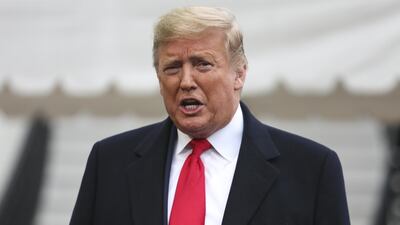The US Treasury Department on Monday abruptly dropped its designation of China as a "currency manipulator" as the two countries tried to calm trade tensions.
The move comes days before top officials of the world's two largest economies were due to sign a preliminary trade agreement to ease the 18-month tariff war. The trade war has slowed US manufacturing and caused a global economic slowdown.
The widely expected decision came in a long-delayed semi-annual currency report, reversing an unexpected move made last August by Treasury Secretary Steven Mnuchin at the height of US-China trade tensions.
Mr Mnuchin had accused China of deliberately holding down the value of its yuan to create an unfair trade advantage, just hours after President Donald Trump, angered at the lack of progress in trade negotiations, had also accused China of manipulating its currency.
The Treasury Department has not labeled China as a currency manipulator since 1994, under President Bill Clinton.
The “phase one” trade deal, due to be signed on Wednesday, promises billions of dollars’ worth of agricultural purchases and the beginning of reforms to China’s longstanding practice of forced technology transfer.
Chinese Vice Premier Liu He arrived in Washington on Monday for a White House ceremony to sign the trade deal with Mr Trump on Wednesday. People familiar with the negotiations had said that although the manipulator designation had no real consequences for Beijing, its removal was an important symbol of goodwill for Chinese officials.
The report said the Chinese yuan had depreciated as far as 7.18 per US dollar in early September, but had rebounded in October and was currently trading at about 6.93 per dollar.
"In this context, Treasury has determined that China should no longer be designated as a currency manipulator at this time," the report said.
It said, however, China should take decisive steps to avoid a persistently weak currency and allow greater market openness to strengthen its long-term growth prospects. It placed China along with nine other trading partners including Germany, Italy, Japan, Korea and Vietnam on its monitoring list.
There was no immediate reaction from Beijing, but China's central bank has previously denied it had intervened to weaken the yuan, and said Washington's designation of China as a currency manipulator seriously harmed international rules.
Mark Sobel, a former senior Treasury official and adviser to the London-based OMFIF economy policy think tank, welcomed the Treasury move, and said that China "was errantly designated at a moment of presidential pique."
"It should never have happened in the first place," he said. "China manages, but does not manipulate its currency."
Mr Sobel said China's current account surplus was small as a share of gross domestic product and it had not intervened in currency markets for years. The August move came at a time when the yuan had fallen against the dollar because of market apprehension over Trump's "ratcheting up of trade tariffs," he said.
US Senate Democratic leader Chuck Schumer, a fierce critic of China's currency and trade practices, blasted the Trump administration for its decision to "back down" from labeling China as a currency manipulator.
"China is a currency manipulator - that is a fact," Mr Schumer said in a statement released by his office. "Unfortunately, President Trump would rather cave to President Xi (Jinping) than stay tough on China."
The yuan reached five-month highs earlier on Monday amid heavy demand ahead of this week's expected signing of the trade deal.

